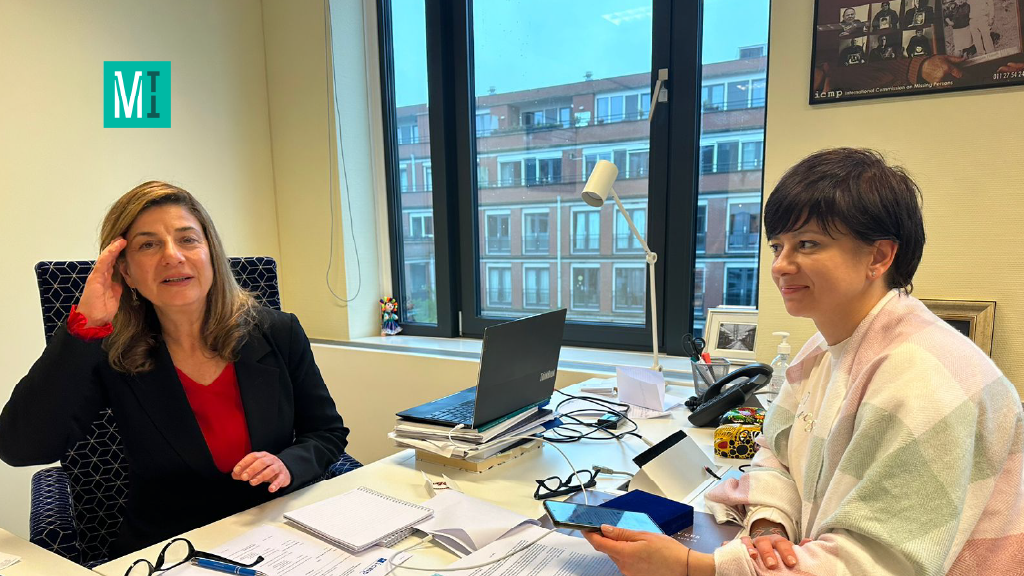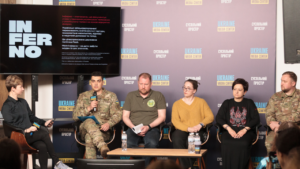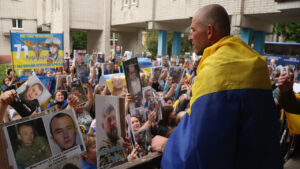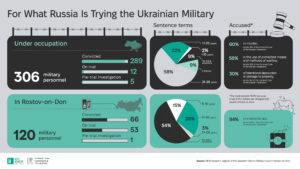Kathryne Bomberger: “It is critical that the process of identifying missing persons be based on DNA analysis”

The search and identification of missing persons is the most complicated but most necessary procedure during a war. Especially when an enormous number of people takes part in a country’s defense. The most accurate method of a person’s identification is their DNA analysis. However, in the conditions of the super-intensive war of Russia against Ukraine, the latter lacks capacities for such work. As a result, the process of identification is never-ending.
The International Commission on Missing Persons (ICMP), which specializes in DNA identification of people and has a powerful laboratory, could provide assistance in this task. However, the Government of Ukraine has been hindering the execution of the cooperation agreement therewith for months.
The MIHR met with Ms. Kathryne Bomberger, Director-General of the ICMP, to find out the reason for such delay and to learn about the capacities of the ICMP’s DNA laboratory and how to search for missing persons during the war.

The ICMP and the Ukrainian Government have yet to agree on the cooperation. If the agreement is signed, what will be the result?
— Once we sign the agreement, the ICMP wants to partner with civil society representatives and various institutions and ministries responsible for locating and identifying missing persons. Basically, the cooperation agreement is an invitation for us to do many of the things that we want to do, including assisting in the excavation and investigation into mass and clandestine graves to ensure that they are properly documented and evidence is collected to a standard where that evidence can be provided to an international court.
And all of the data is entered into a centralized data system. The proper chain of custody is maintained from the location of the crime scene to the examination of the mortal remains, from cause and manner of death.
And when it comes to the identification, we would also like to support the process in Ukraine by providing support in DNA-based identifications. To ensure the impartiality of the process, and I’m not saying that it’s not, but to ensure, for perception reasons, we want to make sure that we are prepared to do the testing here, in the laboratory that you saw. The laboratory is going to get bigger because we want to help Ukraine, so we want to make sure that we are ready when Ukraine is ready.
Ukraine has DNA laboratories. What is special about yours?
— Unlike the laboratories in Ukraine, our laboratory only focuses on human identification. And we designed our lab this way because conducting human identification has to have a good separate process. Because in Ukraine, the labs are doing many other things regarding criminal investigations. They are looking at ballistics, they are looking at evidence at the crime scene regarding perpetrators in cases where there was sexual violence or other types of violence. So, they are doing many other things. All we would do is just focus on human identification. Like we do with many other countries, because that capacity you don’t normally need, and Ukraine has to do many other investigations.
And because we learned during other wars, we have become specialists in many things in our lab, including being able to extract DNA from very difficult post-mortem samples, including those that were burned. So, this will take time.
And to support this as well, we would want to work with you, with our partners, and with Ukrainian institutions to collect a huge amount of reference samples from families of the missing.
What would be the identification for Ukraine in terms of figures?
— Currently, probably, that would be close to 100,000 inside Ukraine and outside Ukraine. And that’s critical to making a DNA-led process.
We are also available to provide evidence regarding DNA matches in international courts and domestic courts. We have already provided evidence in over 35 international and domestic courts.
And then, of course, helping to build institutions, the laws on missing persons, to have the growing number of families of the missing across Ukraine understand the whole process because it is one component of all the many things and atrocities taking place in Ukraine during the war, just one component.
What will you do if the Ukrainian government does not sign the agreement?
— Well, it’s already going on longer than we thought, but I’m very optimistic. Because it would make no sense. No country, even Ukraine, even the United States, even the Netherlands, could systematically, to a level of evidence that is required, find this many people. Everyone needs help.
There is a thought that the Ukrainian Government does not want to include the ICMP in the search for missing persons and identification of killed persons’ bodies due to its concerns that you will get access to the actual figures of losses in Ukraine. What is your position on that?
— I think that’s going to be a challenge because we have to respect the need for confidentiality, especially regarding dead and missing soldiers in the war. We understand that. So, we’ll just have to work out a way to address that, but in the end, we are invited. We are here to help. We have a partnership, and when you become partners, you have to negotiate where you want help, that’s all.
If I were in Ukraine’s position… I really don’t understand why any offer to support this process by an organization with such expertise is only doing one thing, especially when there is an ongoing war, and not forever. I mean, it’s not our intention to be in Ukraine forever, Ukraine is fully capable, but it is fighting a war, and that war is not only resulting in human casualties, but it’s also a war of misinformation that Ukraine is fighting as well. So, by having more allies, you can ensure that impartial reliable information is there and verify facts. It’s in the interests of Ukraine and its citizens.
Why are you so focused on DNA identification?
— I mean, there will be lies, there are already our lies about what’s happing. We know about these lies. For example, in the Balkans, in Srebrenica: I shudder even to think, had we not been there and used the DNA-led process, there would be a complete and utter denial that there was a genocide. These court cases, I wonder, what would they be about?
I think it’s not just the physical, it’s also the war of misinformation. The war, the battle concerning the misinformation and the truth. And we are allies in providing that truth.
The personal information you gather is extremely sensitive. What are the guarantees of its security and of third parties’ not having access thereto?
— The way we operate is with families. Number 1, as I said before, is that the data belongs to the families of the missing, and we are simply collecting it to use to find the missing person and ensure that the perpetrators are held to account.
For example, we already have cases with the National Police that would like some of the data we’ve collected from families. And they already gave us their informed consent to share with a third party. So, our colleagues in Kyiv have already gone back to families of the missing and asked: “Are you willing to share your data with the National Police?”
So, this is a journey. Once we embark on a relationship with a family, it’s a long, long process because then another day will come when the Prosecutor of the International Criminal Court or the Trial Chamber will say: “Can the family share the data with the Trial Chamber?” We will have to go back to the families. So, whenever we hold the data, we must return and receive permission.
And what about the protection of the information on identified post-mortem samples?
— And when we receive a post-mortem, like a bone sample, let’s say, from the government, we would do this through a court order. The bone sample would go to evidence custodians. They would strip it of any identifiers, and then it would go to the lab, and the lab won’t even know where it comes from. So, we have confidentiality agreements with the state and would not share that data with anyone except for the state that gave us the bone sample.
During the interview, Kathryne Bomberger shows the DNA match between a post-mortem and a reference sample, explaining the details:
— And this is a DNA match report. We are matching the bone sample to the family’s reference samples, and we get a match report. And this is a final report, and there is information here that links the sample back to the crime scene. The families gave us the reference samples. We don’t have to include any genetic information of the families because we would protect that. You can see all these decisions. That is why we work as partners. So, the family’s data is protected, and the family relationships are also protected. And then this report is given back: if it’s the National Police that gave us the bone sample, we would return this report to the National Police. And then, the National Police have to take this report and match it to the body. And they have to examine the cause and matter of death. And then they have to inform the family. In this process, imagine, thirty thousand, forty thousand, fifty thousand families of missing persons already. You can see why this is a very intricate, meticulous process. It’s too much. This is not easy. I mean, the excavation that has to take place, cutting off the bone sample, ensuring you know where the body is, working with the families, constantly informing the families of the status of being able to make this match. It’s a very, very meticulous process.
You obviously have great understanding of DNA identification. What do you think: why hasn’t Ukraine still concluded the agreement with the ICMP?
— We need to have the same meeting we are having with you with the Ministry of Interior, the SBU, and the Ministry of Health, all at the same time because I don’t think they know what they don’t know. Because if you do one case like this one at a time, it will take forever. While we do 85 cases like this a day.
This is 2023, and people must move, and Ukraine is going through hell. I mean, this is hell on earth, and we are offering support because we have done this before. Anyway. I haven’t met Mr. Kotenko yet, but I’m looking forward to it. I met him online, and I don’t mean to personalize this or anything, but this is 25 years of experience; even me, and I’m not a DNA specialist, I have been working on these things, and it’s very important, very meticulous work that requires cooperation. It’s not about the intelligence, I mean, Ukrainian scientists are excellent, I met with them, it’s not about any of these things. It’s about the numbers. Your enemy is very cruel.
Irrespective of signing the agreement with Ukraine, a missing person’s family can cooperate with you, and apply to you, right?
Yes, they can. And, please, don’t misunderstand me: it’s very important that Ukraine does all of this. It’s just that there are components that, really, any government would need help with. It’s not to diminish them, they are doing an amazing job, really, it’s not about that. It’s about partnerships and efficiency, transparency, impartiality, and partnerships with families. I mean, as I keep saying, there is one thing, and it’s cooperation.
The ICMP worked in the Balkans and in Syria. Given your experience, how efficient are you, and how can your efficiency be assessed, e.g. in figures?
— Look, well, as I said earlier, I think, all the elements in this case bode well for a good process. The only other good process is the Western Balkans. Because there was an international court, there is one for Ukraine, there is political will, there are strong women like you, and strong civil society organizations. This is high on the international community agenda. I can tell you, having been in the Balkans for a long time too: 1996, very high on the political agenda. And then the invasion of Ukraine, 9/11, it disappeared. And when it disappears, it’s like that you are on your own. Already, Syria is not high on the political agenda. I don’t want to be a pessimist, but this is the world we live in. That’s why I keep saying: time is of the essence.
We have stock-taking reports on all of these things. These are a little outdated, but there are the numbers, I don’t have any more of these, but we can send them to you. They are also on our website. This is the number in the former Yugoslavia of people that died: probably 160,000. This is the number of dead in Bosnia and Herzegovina and then the number of missing in Bosnia and Herzegovina. This is just killed, and this is missing. And the number of persons accounted for, the percentage. And this is just for Srebrenica itself, here, almost 90%. Because that’s the number of identified: it’s almost 90%, the 8,000 Muslims. This is unprecedented. This had never happened, and Iraq is not easy, trust me, we haven’t been able to achieve the same thing.
We’ve done the full analysis of these things, and we can share this with you. And we would like to take all of you to Sarajevo so that you can see first-hand the institutions, the prosecutors of this, the families of the missing, and how it worked. In the region, there were 40,000, but this is just Bosnia, the number of reference samples collected. You can read all this, but it is a lot of work. And when speaking to the people who did this work, not to someone in an office! We want to give it all to you, to share, always.
Translated from Ukrainian by Olena Balatska







